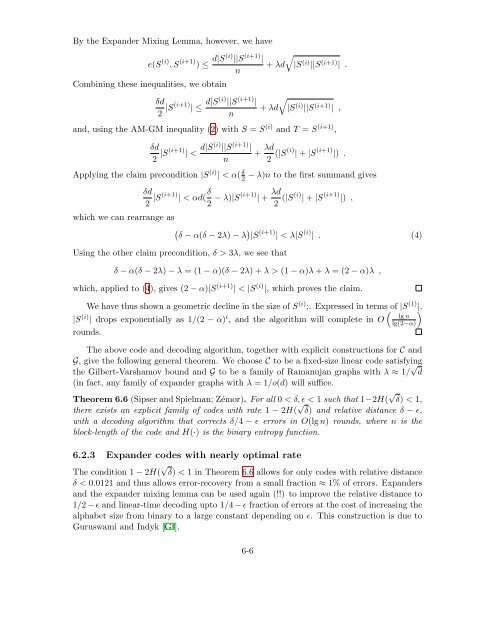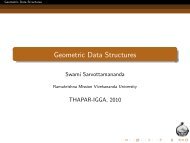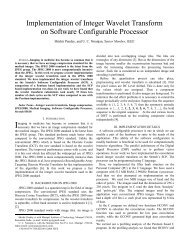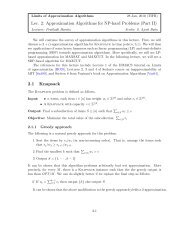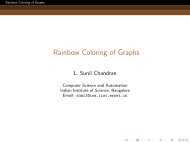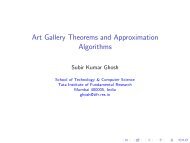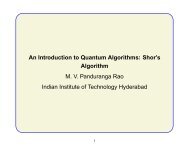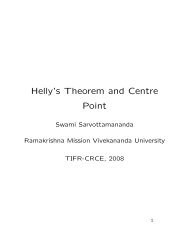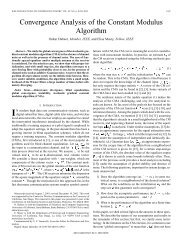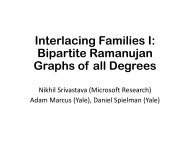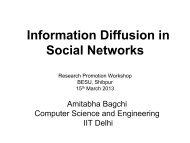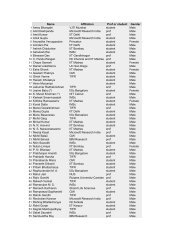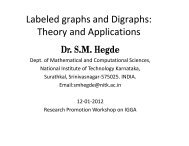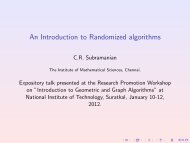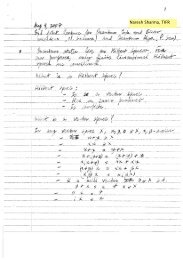Lecture 6: Expander Codes 6.1 Error Correcting Codes â Preliminaries
Lecture 6: Expander Codes 6.1 Error Correcting Codes â Preliminaries
Lecture 6: Expander Codes 6.1 Error Correcting Codes â Preliminaries
Create successful ePaper yourself
Turn your PDF publications into a flip-book with our unique Google optimized e-Paper software.
By the <strong>Expander</strong> Mixing Lemma, however, we have<br />
e(S (i) , S (i+1) ) ≤ d|S(i) ||S (i+1) √<br />
|<br />
+ λd |S<br />
n<br />
(i) ||S (i+1) | .<br />
Combining these inequalities, we obtain<br />
δd<br />
2 |S(i+1) | ≤ d|S(i) ||S (i+1) √<br />
|<br />
+ λd |S<br />
n<br />
(i) ||S (i+1) | ,<br />
and, using the AM-GM inequality (2) with S = S (i) and T = S (i+1) ,<br />
δd<br />
2 |S(i+1) | < d|S(i) ||S (i+1) |<br />
+ λd<br />
n 2 (|S(i) | + |S (i+1) |) .<br />
Applying the claim precondition |S (i) | < α( δ 2<br />
− λ)n to the first summand gives<br />
δd<br />
2 |S(i+1) | < αd( δ 2 − λ)|S(i+1) | + λd<br />
2 (|S(i) | + |S (i+1) |) ,<br />
which we can rearrange as<br />
(<br />
δ − α(δ − 2λ) − λ<br />
)<br />
|S (i+1) | < λ|S (i) | . (4)<br />
Using the other claim precondition, δ > 3λ, we see that<br />
δ − α(δ − 2λ) − λ = (1 − α)(δ − 2λ) + λ > (1 − α)λ + λ = (2 − α)λ ,<br />
which, applied to (4), gives (2 − α)|S (i+1) | < |S (i) |, which proves the claim.<br />
We have thus shown a geometric decline in the size of S (i) ;. Expressed in terms( of |S (1) ) |,<br />
|S (i) | drops exponentially as 1/(2 − α) i , and the algorithm will complete in O lg n<br />
lg(2−α)<br />
rounds.<br />
The above code and decoding algorithm, together with explicit constructions for C and<br />
G, give the following general theorem. We choose C to be a fixed-size linear code satisfying<br />
the Gilbert-Varshamov bound and G to be a family of Ramanujan graphs with λ ≈ 1/ √ d<br />
(in fact, any family of expander graphs with λ = 1/o(d) will suffice.<br />
Theorem 6.6 (Sipser and Spielman; Zémor). For all 0 < δ, ɛ < 1 such that 1−2H( √ δ) < 1,<br />
there exists an explicit family of codes with rate 1 − 2H( √ δ) and relative distance δ − ɛ,<br />
with a decoding algorithm that corrects δ/4 − ɛ errors in O(lg n) rounds, where n is the<br />
block-length of the code and H(·) is the binary entropy function.<br />
6.2.3 <strong>Expander</strong> codes with nearly optimal rate<br />
The condition 1 − 2H( √ δ) < 1 in Theorem 6.6 allows for only codes with relative distance<br />
δ < 0.0121 and thus allows error-recovery from a small fraction ≈ 1% of errors. <strong>Expander</strong>s<br />
and the expander mixing lemma can be used again (!!) to improve the relative distance to<br />
1/2 − ɛ and linear-time decoding upto 1/4 − ɛ fraction of errors at the cost of increasing the<br />
alphabet size from binary to a large constant depending on ɛ. This construction is due to<br />
Guruswami and Indyk [GI].<br />
6-6


